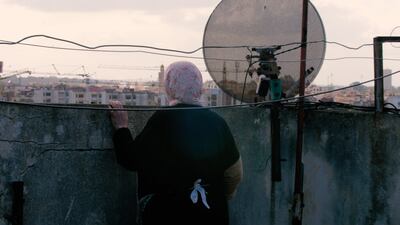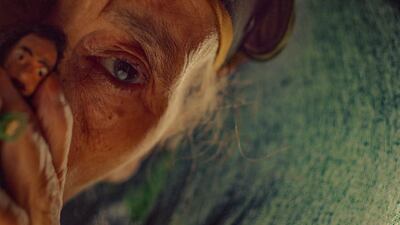When Asmae El Moudir discovered that her first film, documentary feature The Mother of All Lies, had been selected for this year’s Cannes Film Festival, she couldn’t quite take it in.
“It's a dream come true,” she says. “All directors dream of Cannes. It's a big festival. For me and my cast, who are not professional actors, we are all coming from a simple neighbourhood in Casablanca. So it’s a big thing for us.”
The Moroccan first-time director is no stranger to Cannes, however. Last year, she visited the famous French film festival’s market, trying to launch another project. Now, The Mother of All Lies is set to be unveiled in the prestigious Un Certain Regard sidebar. “I'm super excited to watch my film in the great Debussy theatre,” she says. More so, because she will be watching with members of her family, the stars of the film.
While El Moudir has been based in Paris for the past two years, her mother has just got her visa to visit France and her grandmother is awaiting hers. “She started to make noise – 'if I will come to France, I don't want to see alcohol in my table',” says El Moudir. I suggest that may be difficult in France. But it rather sums up the combative relationship El Moudir shares with her grandmother, two women from very different generations. As the film shows, El Moudir isn’t afraid to express her feelings, calling her strict elder “a killjoy” at one point.
“This confrontation between me and my grandmother in this film will continue even in Cannes … and this is what is special,” she says. What’s interesting about The Mother of All Lies is that it begins with familial conflict and widens out to a major historical event in Moroccan history. A film she’s been thinking about and working on for a decade, it began when El Moudir questioned her family as to why she only has one photograph of her from childhood. And, bizarrely, the out-of-focus girl in the photo isn’t even her.
“I started with a personal issue,” she says. “How we create stories, when we don't have any concrete or visual proof of what has happened in the family.”
She began to interrogate her parents and grandmother about their past. Why exactly was there this lack of documentation? Having studied at La Femis in Paris and holding a master’s degree in production from the Superior Institute of Information and Communication in Rabat, El Moudir did what she knows best and picked up a camera. Initially it yielded little. “I started to film my family,” she says. “Nothing interesting happened!”
Then she hit on a unique idea. With her father’s help, she built a scale model of the neighbourhood in Casablanca where they grew up. Dolls were made to represent her family and neighbours. Using these props, she was able to get her family to start talking about the past, and in particular, the 1981 Bread Riots, which took place in Casablanca nine years before El Moudir was born. A violent revolt against rising food prices, the official death toll was 66, although opposition estimates put it much higher. “I had no idea about this because there was nothing before: no pictures, no images, nothing.”
It was only when her mother mentioned the Bread Riots that she began to probe. El Moudir discovered that the best way to get people to open up was by re-enacting events via this intricate scale model set, a sort of surrogate playground for her “cast” to unburden themselves. “People still have a fear and are afraid to talk,” she says. “So the idea is to take these people to another place where they can talk freely about what happened without thinking that the walls have ears, as they think, in their houses. So this was the idea to create a space that we can destroy after the film.”

Gradually, El Moudir began to learn more about this sensitive period of Moroccan history, and her family’s involvement. “I felt that the best way to talk about the political side is to dig into ourselves first,” she says. “I started by [discovering] small lies that grew up in my family, but these lies grew up and broke the walls of my house.”
As more revelations tumbled, El Moudir began to peel back the layers of misinformation – what she calls “the mother of all lies” – surrounding the Bread Riots. Then, she says, “I made the link between the personal and national story.”
El Moudir’s film is likely to strike a chord with anyone who saw Joshua Oppenheimer’s The Act of Killing, the 2012 Oscar-nominated documentary about Indonesian mass murders, when the director enticed perpetrators to re-enact horrifying events. Here, it's the victims who are delving back into their lives, dredging up long-buried, shame-filled memories. “I think this is the important thing for me – how we can find a way to tell this very painful story,” says El Moudir, who compares her technique to holding a “mirror” up to her family.
So how is she feeling now the film is about to play in Cannes? Is she expecting it to cause controversy? She shakes her head. “I'm looking forward to meeting the audience and knowing how the audience will accept the film. I’ve cared about this film for 10 years. This is not mine now. When it will premiere in Cannes, it will be no more my film. It’s the film of everyone.”
The Mother Of All Lies' premiere at the Cannes Film Festival is on Tuesday.

